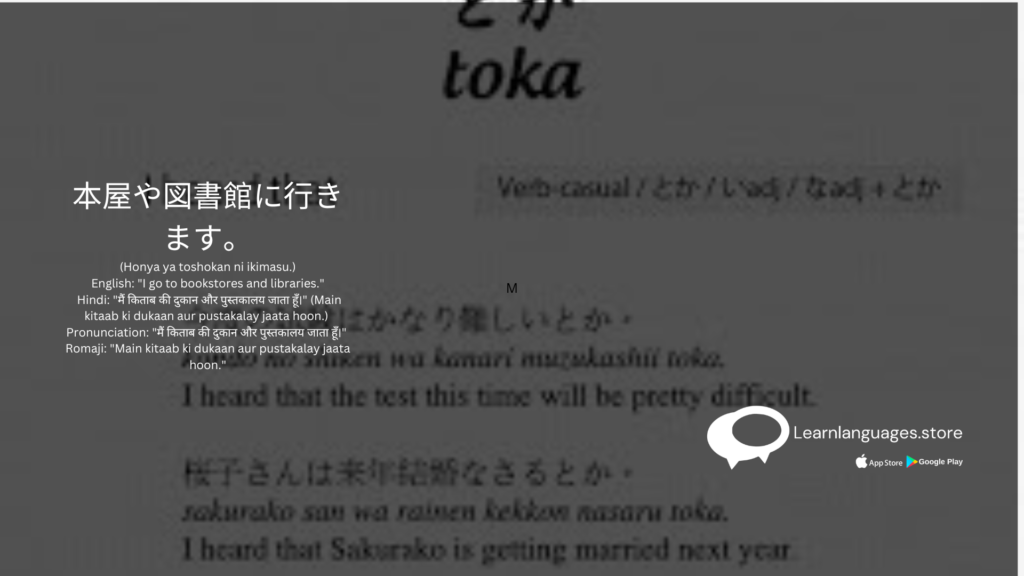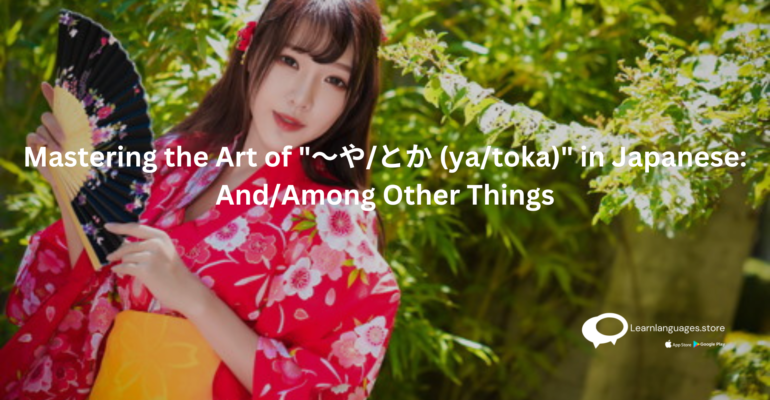Mastering the Art of “〜や/とか (ya/toka)” in Japanese: And/Among Other Things
Mastering the Art of “〜や/とか (ya/toka)” in Japanese: And/Among Other Things
Estimated reading time: 4 minutes

INTRODUCTION:
Konnichiwa, fellow Japanese language enthusiasts! Today, we dive into the versatile and often humorous realm of Japanese grammar with a focus on “〜や/とか (ya/toka).” These handy particles allow you to list items or actions, adding flavor and nuance to your conversations. Whether you’re talking about your favorite foods, daily activities, or the many ways your cat gets into trouble, 〜や/とか (ya/toka) have got you covered. So, let’s explore these fascinating grammar tools with plenty of funny and engaging examples!
Understanding “〜や/とか (ya/toka)”:
In Japanese, “〜や (ya)” and “〜とか (toka)” are used to list multiple items or actions, similar to “and” or “among other things” in English. They provide a way to give examples without being exhaustive.
Sentence Structure:
The structure for using “〜や (ya)” and “〜とか (toka)” is as follows:
[Noun/Verb] + や/とか + [Noun/Verb] + や/とか + …
Both “〜や (ya)” and “〜とか (toka)” can be used interchangeably, though “〜や (ya)” is slightly more formal than “〜とか (toka).”
Examples with 〜や (ya):
- 寿司やラーメンが好きです。 (Sushi ya rāmen ga suki desu.)
English: “I like sushi and ramen.”
Hindi: “मुझे सुशी और रेमन पसंद है।” (Mujhe sushi aur ramen pasand hai.)
Pronunciation: “मुजे सुशी और रेमन पसंद है।”
Romaji: “Mujhe sushi aur ramen pasand hai.” Imagine someone listing their favorite Japanese dishes with a gleeful smile. - 本屋や図書館に行きます。 (Honya ya toshokan ni ikimasu.)
English: “I go to bookstores and libraries.”
Hindi: “मैं किताब की दुकान और पुस्तकालय जाता हूँ।” (Main kitaab ki dukaan aur pustakalay jaata hoon.)
Pronunciation: “मैं किताब की दुकान और पुस्तकालय जाता हूँ।”
Romaji: “Main kitaab ki dukaan aur pustakalay jaata hoon.” Picture a book lover sharing their favorite hangout spots with enthusiasm.
Examples with 〜とか (toka):
- パーティーでピザとかケーキを食べました。 (Pātī de piza toka kēki o tabemashita.) English: “I ate pizza and cake at the party.” Hindi: “मैंने पार्टी में पिज्जा और केक खाया।” (Maine party mein pizza aur cake khaya.) Pronunciation: “मैंने पार्टी में पिज्जा और केक खाया।” Romaji: “Maine party mein pizza aur cake khaya.” Visualize someone recounting the delicious treats they had at a lively party.
- 休みの日には映画とかゲームをします。 (Yasumi no hi ni wa eiga toka gēmu o shimasu.)
English: “On my days off, I watch movies and play games.”
Hindi: “छुट्टी के दिन मैं फिल्में देखता हूँ और खेल खेलता हूँ।” (Chhutti ke din main filmein dekhta hoon aur khel khelta hoon.) Pronunciation: “छुट्टी के दिन मैं फिल्में देखता हूँ और खेल खेलता हूँ।”
Romaji: “Chhutti ke din main filmein dekhta hoon aur khel khelta hoon.” Imagine a relaxed weekend filled with favorite leisure activities.
Exceptions and Usage:
While “〜や (ya)” and “〜とか (toka)” are generally straightforward, here are a few nuances:
- Formality: “〜や (ya)” is slightly more formal than “〜とか (toka),” making it more suitable for polite conversations or written language.
- Contextual Flexibility: Both particles can be used with nouns and verbs, but “〜とか (toka)” is more commonly used in casual speech and when listing multiple examples or possibilities.
Identifying in a Sentence:
In the sentence “寿司やラーメンが好きです” (Sushi ya rāmen ga suki desu), “〜や (ya)” is used to list sushi and ramen as examples of foods the speaker likes. It shows the versatility of the particle in combining items.
Conclusion:
Congratulations, dear readers! You’ve now mastered the art of listing with “〜や/とか (ya/toka)” in Japanese grammar. These particles are perfect for adding humor, nuance, and detail to your conversations, whether you’re sharing your favorite foods or recounting your weekend activities.
Arigatou gozaimasu for joining me on this linguistic journey. Until next time, mata ne! 🎌
-
Product on sale
 Japanese N3
Japanese N3₹42,600.00
₹62,600.00 -
Product on sale
 Japanese N4
Japanese N4₹24,300.00
₹32,600.00 -
Product on sale
 Japanese N5
Japanese N5₹18,300.00
₹24,300.00
Learn Languages Store
Vashi,
Email: services@learnlanguages.store










